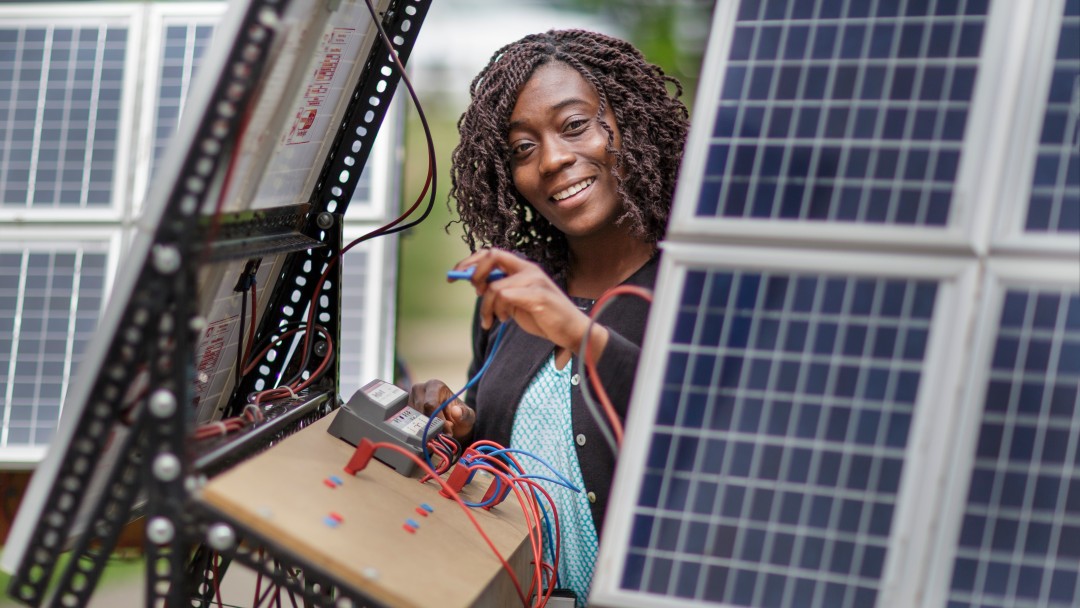News from 2021-12-03 / KfW Development Bank
Decentralised solutions bring electricity to African villages
KfW establishes community foundations for decentralised electrification in sub-Saharan Africa

Most people in Africa have no electricity. To supply the region south of the Sahara with climate-friendly energy, KfW has established a foundation on behalf of the German Federal Government and provided it with start-up capital of EUR 49 million. The funds are to be used to create renewable energy systems that avoid the emission of 55,000 tonnes of carbon dioxide annually and provide more than 350,000 people with access to clean electricity.
Candles instead of light bulbs, wood cookers instead of hotplates - in large parts of rural sub-Saharan Africa they characterise everyday life. Women walk long distances to find firewood. More than half of the people in sub-Saharan Africa have no access to electricity. A growing economy and population are also increasing demand. Electrification of even remote rural regions would provide a boost to development. Children could read and study at home in the evenings, housework would be made easier, small businesses could use electricity. Cooling for transport and storage of vaccines would also be ensured.
The recovery from the pandemic offers Africa a chance to boost growth using renewable energy. This is not only climate-friendly, but also creates jobs. No power lines need to be built. Small, privately operated solar systems that function independently of the public grid (so-called mini-grids) are a sustainable solution, especially for remote regions. They can supply electricity to pumps, mills or cooling systems, for example.
Innovative financing
On behalf of the German Federal Ministry for Economic Cooperation and Development (BMZ), KfW has now established the foundation “Clean Energy and Energy Inclusion for Africa” (CEI Africa), which provides funding for the acquisition and installation of such mini-grids. Grants from the foundation provide incentives for companies in Africa to invest in renewable energies. In addition, CEI Africa will partner with digital lending platforms called crowdlenders to finance mini-grids and small energy solutions such as solar lighting, home solar systems, solar-powered mills, pumps and cooling systems. The foundation will have an initial budget of up to EUR 49 million.
Up to now, the operators of existing mini-grids in Africa have often been small and medium-sized enterprises with limited access to financing. The project is intended to make it easier for them to grow as well.
High need for investment
The World Bank estimates that up to twelve billion US dollars will be needed to set up mini-grids in Africa over the next ten years. Local banks often lack the know-how, staff and capital to finance them. The Corona pandemic has further complicated the provision of funds locally.
The foundation is therefore taking an innovative approach and enabling citizens from all over the world to participate in the financing of projects reviewed and financed by the foundation via crowdlending. For this purpose, the foundation enters a cooperation with platforms such as the Swedish crowdlender "TRINE". In this way, small savers, including migrants (diaspora investors), can participate in the financing of the mini-grids.
At least 190 mini-grids
The aim of the project is to use the funds of the CEI Africa foundation to enable at least 190 mini-grids and other small, decentralised and climate-friendly solutions for energy supply. Climate-friendly electricity generation capacities of almost 17 megawatts will be created. Emissions of 55,000 tonnes of carbon dioxide will be avoided annually from the time the mini-grids come on stream. More than 350,000 people will gain access to clean electricity.
Switzerland and Austria have already signalled concrete interest in participating in the foundation. The goal is to increase the number of electricity connections supported by the foundation tenfold in 10 years through the commitment of other donors. The project contributes to the reduction of energy poverty, i.e. the development goal SDG 7 to realise electricity for all by 2030.
Wide range of approaches
The CEI foundation is not Germany's only initiative to promote sustainable energy in Africa. With "Green Citizen Energy for Africa: Mozambique", KfW is committed to building mini-grids in Mozambique on behalf of the BMZ with around EUR 23.5 million. This will supply at least 7,000 businesses and households in remote rural regions, some of which will receive electricity for the first time.
In other cases, environmentally harmful diesel generators will be replaced. In total, plants with a capacity of about three megawatts of electricity are being built. The innovative aspect of the solution is that in addition to the mini-solar power plants, energy storage systems are also being installed and funds are being made available to promote the commercial use of electricity and thus employment. Mozambique is one of the ten poorest countries in the world. "Green citizen energy" projects that serve rural electricity supply exist in eight other countries in Africa. On behalf of the German government, KfW uses a wide range of approaches to meet the specific needs of each region.

Share page
To share the content of this page with your network, click on one of the icons below.
Note on data protection: When you share content, your personal data is transferred to the selected network.
Data protection
Alternatively, you can also copy the short link: https://www.kfw-entwicklungsbank.de/s/enzBWrMC.CnBA
Copy link Link copied